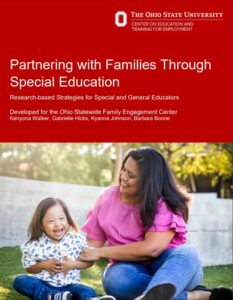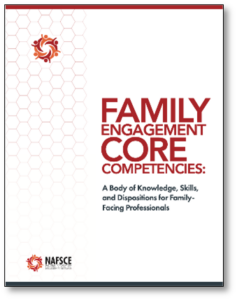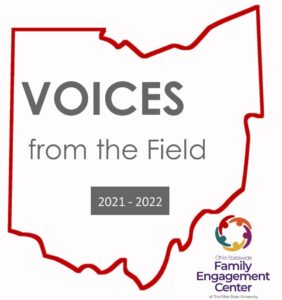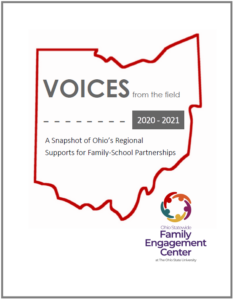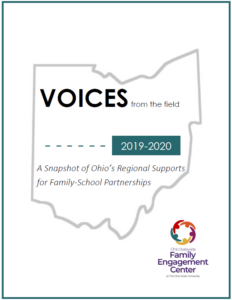2022-2023
Each year, Ohio’s Statewide Family Engagement Center produces a report to highlight work being done by educational consultants in each of Ohio’s 16 State Support Team offices participating in Ohio’s Family and Community Engagement Network. To effectively fulfill their important role supporting schools, districts, and families throughout their region, consultants engage in on-going and rigorous professional learning.
Check out the amazing work produced by each work group below and revisit past editions of Voices from the Field by clicking on previous editions at the bottom of this page.
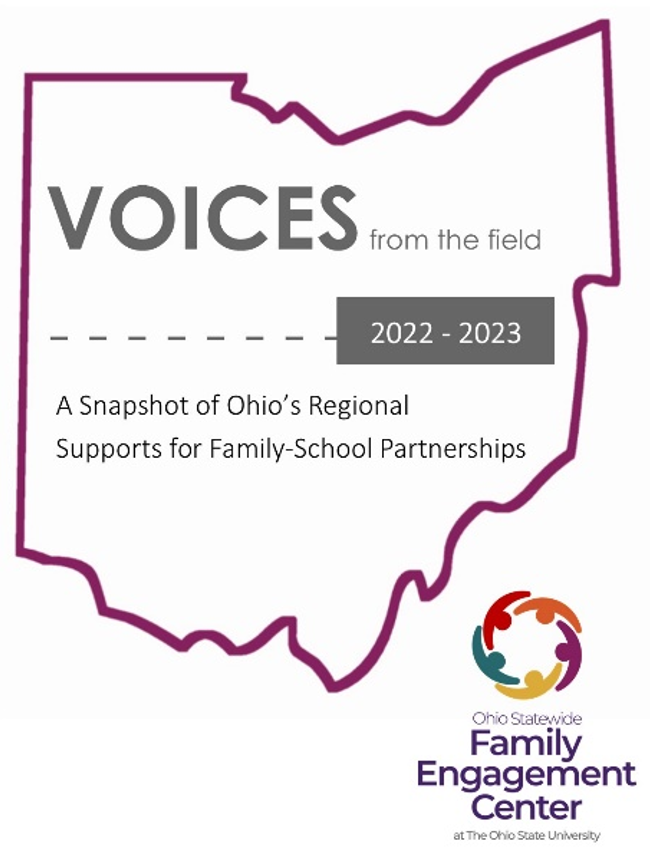
Professional Learning Focus for 2022-23
This year, our network did a “deep dive” during our meetings into the content from two publications:
- Partnering with Families Through Special Education: Research Brief, and
- Core Competencies for Family Facing Professionals.
For each publication, our members created “coaching prompts” that they could use pertaining to each topic while working with school districts. Coaching prompts are a question or statement used in instructional coaching discussions amongst educators to guide growth and development.
In this Voices Report, we share a brief description of each publication, followed by the coaching prompts developed by our FCE Network. We invite you to try some of the coaching prompts associated with these publications in your work with educators!
Partnering with Families Through Special Education
This research brief, developed for the Ohio Statewide Family Engagement Center by Dr. Kenyona Walker, Dr. Gabrielle Hicks, Kyanna Johnson, and Dr. Barbara Boone, summarizes 30 research studies from which they distill seven recommendations that can strengthen family-school-community partnership in support of success for students with disabilities. These recommendations are not only derived from research – they are also are consistent with widely accepted family engagement frameworks and the Federal Individuals with Disabilities Act.
Coaching Prompts
- What do we want a parent/caregiver and student to walk away with following this meeting? Does our agenda ensure this will happen?
- What funds of knowledge does this family hold? How are we leveraging these funds of knowledge as we plan together for this student’s success?
What meeting protocol or other strategy can we use to ensure we hear from everyone in the room during a meeting, in particular the parent/caregiver?
- How do we ensure that families and students are aware of and understand the special education process? Are resources and conversations free of jargon? Have we taken time to explain resources? Do parents know with whom they can follow up if they have questions?
As a team, how are we ensuring that all families can participate fully in conversations about their student?
- What does our communication with families look like? Sound like? Is it positive and proactive? Is it two-way? Does it build trust and invite partnership?
- Do families have information and the ability to express themselves in their home language?
- What opportunities do families have to provide their input beyond the normal channels of communication? Focus groups? Surveys? Opportunities to collaborate?
- Do our family-facing professionals have the skills and opportunities to practice those skills needed to partner with families in a productive and also authentic way?
- How are you ensuring that families know their knowledge and expertise is important for the team?
- What processes do we have in place to develop consensus among the IEP team, including with students and families?
- How do we document family and student visions for success?
- What are some opportunities to supporting families outside of the IEP process?
- Do we have easy to access video clips or materials on your website?
- How do we empower families before formal interactions or meetings? Do we have a process for connecting families to supportive partners like Parent Information Specialists of Parent Mentors?
- Are we considering the vision a family has for their student’s success?
- Do we understand all of the options available to students after high school? How do we plan to express these to students and families?
- How are we ensuring that IEP goals lead to the life goal?
- Do we have a process that is clear and articulable to families and students for transition planning?
- How are we equipping families for IEP meetings?
- How are we equipping students for IEP meetings?
- What conversations do you hope families are having at home related to the IEP? How can we support them in having conversations at home?
- How do our mindsets need to shift so that we treat parents as experts?
- How do we support parents to network with other parents?
- What supports do provide for families who have just found out their child has a disability?
- How can we recruit and connect more parent mentors with districts?
- How can we create parent support groups in the district?
- Are we aware of the Ohio Parent Mentor(s) in this area?
Core Competencies for Family Facing Professionals
Over three years, the National Association for Family, School, and Community Engagement (NAFSCE) worked with a variety of education practitioners, family engagement leaders, and researchers to create a nationally agreed-upon and unifying set of eight professional competencies for the family engagement field. The eight competencies are grouped into four domains representing what family-facing professionals do: Professionals in our field 1) reflect, 2) connect, 3) collaborate for learning, and 4) lead alongside families.
This last school year, our Network Members read, discussed, and took time to create coaching prompts that could aid in their discussions of these competencies with other family-facing professionals.
Coaching Prompts
- How are you as a school or district leader leveraging the funds of knowledge families hold to inform your needs assessments and continuous improvement planning?
- What does co-constructing experiences and opportunities to build family-school partnership with families look like
- What does collaborative planning with families look like? What tools and knowledge do we have to do this?
- How are you sharing data around student behavior and academics in a frequent, understandable, and timely manner with families?
- How are you sharing social emotional learning strategies with families?
- How do you encourage your staff to listen to and consider family input?
- How are you connecting families with community resources?
- How are you structuring your personnel/school day to ensure there is time to communicate with families?
- What tools/technologies are you using to support two-way communication with families?
- How do you know if your communication strategies are working? What data are you using? Who is looking at the data and making decisions based on the data?
- Are you including both classified and certified staff in your data discussions?
- How are you embracing the changing needs of your community?
- How are you ensuring that all your team is provided with professional development to grow their skills?
